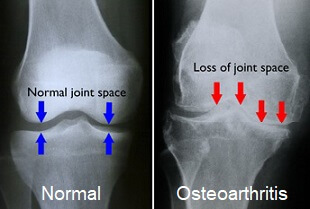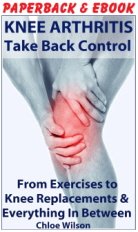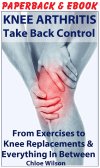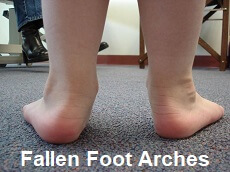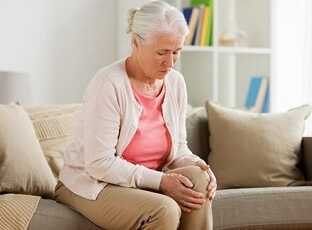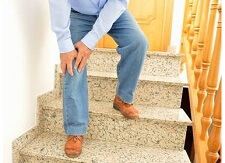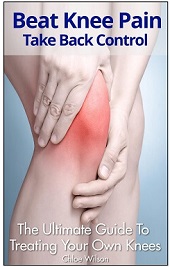- Home
- Knee Arthritis
- Causes
Arthritis in the Knee Common Causes
Written By: Chloe Wilson, BSc(Hons) Physiotherapy
Reviewed by: KPE Medical Review Board
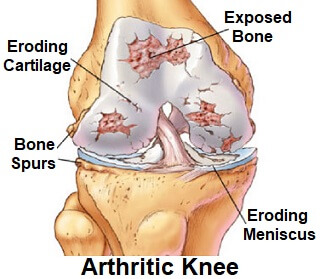
Arthritis in the knee occurs when there is "wear and tear" of the bones and cartilage in the knee. Resultant friction on the joint causes pain, stiffness and disability.
Arthritis may occur throughout the knee or just on one side of the
joint, most commonly on the inner side. It can range from mild to severe and knee arthritis symptoms often fluctuate.
Approximately 11% of people over 64 years of age have arthritis in the knee. There is usually no specific cause of arthritis but there are a number of factors which have been found to be linked with the condition.
Common Causes of Arthritis In The Knee
Here, we will look at the most common causes of arthritis in the knee. You can find out more about the knee arthritis including symptoms, diagnosis and treatment options via the arthritis guide.
1. Aging
Arthritis in the knee is related to, but not caused by aging, and most commonly affects people over 65. As we age, our bones become more brittle, our muscles often weaken, and the body becomes less efficient at healing itself.
As a result, the cartilage and bone is more prone to damage and wear and tear, which can lead to arthritis in the knee.
2. Gender
Women are twice as likely to develop arthritis in the knee as men. The most likely reason for this is hormone levels affecting the cartilage and bone.
3. Weight
Studies have shown that osteoarthritis is three times more likely in people who are overweight (BMI over 27). The more we weigh, the more weight goes through our bones, and therefore the more likely that the cartilage will get worn away.
It is not as simple as saying that if you are overweight you will get arthritis in the knee and if you are thin you won’t, but there is a direct correlation between the two.
4. Previous Injury
Check Out Our Book
All the info you need about knee arthritis, top tips, exercises & loads more.
Rated 4.4/5
Find Out More
Previous knee injuries can cause arthritis in the knee in later life. If you have injured your knee joint in the past e.g. suffered from a meniscus tear, you are more likely to develop arthritis in the knee. This is due to changes in the bones and cartilage from the initial injury, e.g. a broken bone heals but it will never be exactly the same as it was before.
Knee cartilage in particular is very
slow to heal as it has a poor blood supply making it prone to wear and tear and thus arthritis.
5. Previous Knee Surgery
Previous knee surgery can also cause knee arthritis. f you have had to have part of your cartilage removed in the past (known as a menisectomy), you are more likely to develop arthritis in the knee as the cartilage never regrows, which puts more pressure and friction through the bones.
6. Flat Feet
Some doctors and podiatrists believe that having flat feet increases the incidence of osteoarthritis of the knee.
This is thought to be due to the changes in the way the forces are directed through the joint due to the altered foot position, increasing the wear on parts of the knee - usually the inner side.
7. Genetics
Genetics is thought to be a possible cause of arthritis in the knee. While we don’t fully understand the link between genes and arthritis, a link definitely exists. One example of this is that our genes may affect the quality/quantity of our cartilage (some people are born with amazing cartilage, others like me aren’t).
Up to 60% of cases of osteoarthritis are thought to be linked with genetics.
The Arthritis Vicious Circle
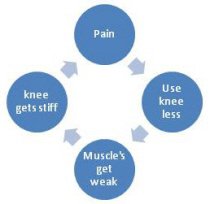
A vicious cycle often develops with arthritis knee pain. Arthritis in the knee causes pain so you stop moving the knee as much. As a result the knee gets stiffer and you lose more movement.
Then when you try and move the knee, it hurts more, so you stop using it and the cycle continues. The same goes for the strength of the knee.
If activities start feeling painful, we tend to avoid them, but then the muscles get weaker. As a result they can’t support the joint and more weight ends up going through the bones rather than the muscles and things get more painful. Yet another vicious cycle.
This is why exercises are one of the best arthritis treatment options. Muscles stay strong by being used.
People often find they go through good spells and bad spells with arthritis in the knee. Stress and tiredness often makes things worse and some people swear that bad weather causes arthritis in the knee to flare up.
What Can Help Arthritis In The Knee?
For hints and tips on overcoming arthritis or for more information on how to tell if you have arthritis in the knee, have a look at these:
- Arthritis Overview: Introduction to Arthritis
- Symptoms & Diagnosis: The symptoms of OA and how is it diagnosed
- Stages of OA: How the disease and symptoms progress
- Treatment Options: Whole range of ways to treat arthritis knee pain
- Diet For Arthritis: Which foods to avoid and which foods can help
- Natural Arthritis Remedies: Including supplements & homeopathy
- Knee Replacements: Replacing an arthritic knee with a new one
- Arthritis Book: Everything you need to know in a handy book
Page Last Updated: 11/01/23
Next Review Due: 11/01/25
Related Articles
Knee Stiffness
June 29, 2022
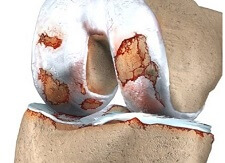
Best Diet For Arthritis
January 11, 2023
Knee Pain On Stairs
January 16, 2023
